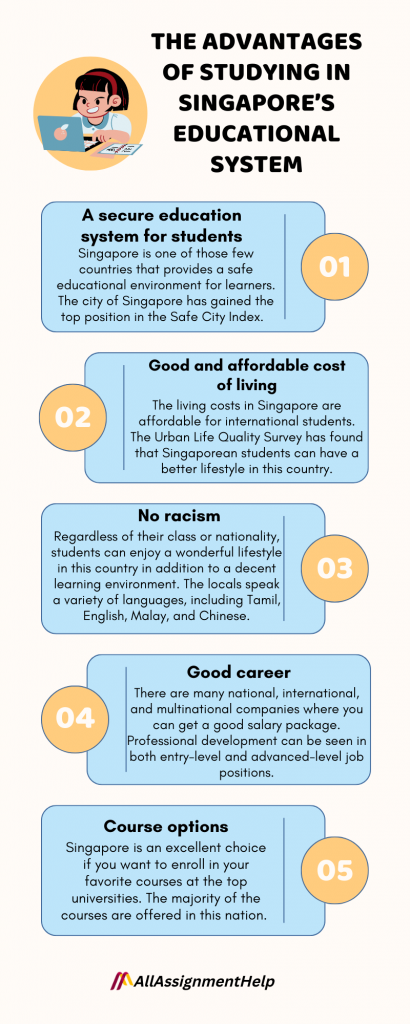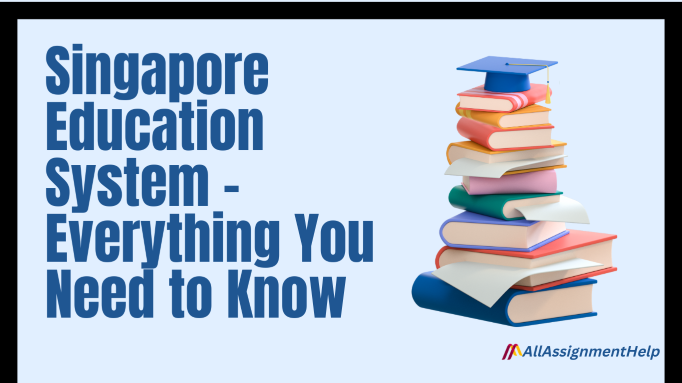Singapore separated from Malaysia and became a sovereign nation on August 9, 1965. Singapore is well renowned for its multicultural population, the colonial area, Kampong Glam, and Top Bay Gardens, among a few other things. More travelers come to Singapore each year attracted to the country’s world-famous cuisine. Education may be the single most important factor that has significantly influenced the development of the nation out of all of these factors simultaneously. The Singaporean government makes every effort to have the best education system in the world. This nation has some of the greatest universities in the world with a 96.81% literacy rate. It would be the best course of action if you were eager to study here. That would be the best course of action if you were interested in learning here. The finest nation for achieving academic success and advancing your career is this one.
Do you want to learn more about Singapore’s educational system? Read the following blog from allassignmenthelp.com and know more.
An Overview of the Education System in Singapore
The Ministry of Education (MOE) in Singapore runs the whole education system in Singapore. For both private and public schools, oversee the tax paperwork, school and tuition funding, and all other matters. The government of Singapore wholly supports the primary and secondary education of its residents. Non-citizens are responsible for all education costs, which are far more than usual. All kids in this country are required to attend nursery and primary school, per the Compulsory Education Act of 2000. According to the Singaporean government, the lack of enrollment of children is a crime. Homeschooling, receiving religious instruction, or enrolling in Northlight schools are a few options for bypassing the conventional educational system. In schools, the English language is employed as a communication and teaching tool. The Mandarin Chinese language is used as an instructional medium at a small number of schools that are recognized under a Special Assistance Plan (SAP).
Also Read: Leading Singapore University: The Seven Wonders!
Ranking of Singapore’s Educational System
According to the Organization for Economic Co-operation and Development (OECD), Singapore is consistently among the top-ranked nations in the world. Nearly all colleges and universities in Singapore offer their students the best educational guidance. All of the kids receive equal attention from the teacher, who also ensures that they all comprehend the curriculum. Singapore has a total primary enrolment rate of 100%. For pupils, the secondary education system is ideal. The only nation with a larger proportion of educated citizens is none other than Singapore. The average QS World University Rankings score for this nation is 92.4, and the average PISA Reading score for this nation is 549. In this country, 29.7% of people over the age of 15 have completed postsecondary education, which is more than in Canada, France, and Belgium altogether. 2.5% of Singapore’s GDP is allocated to education-related spending.
Also Read: 7 Best Nursing Schools And Career Prospects In Singapore In 2022
System of Secondary Education in Singapore
Students can enroll in a Singapore secondary school for secondary education after completing their primary schooling. However, they must submit a Primary School Leaving Examination (PSLE) to the institution in order to pursue their further studies. Singapore’s secondary education is broken down into three divisions. They are express, regular academics, and academics in technical fields. These are all four-year programs. Exam difficulty, mother tongue, and course type set them apart from one another. The majority of the student’s educational costs are covered by the government, and their parents are only responsible for a small portion of the monthly payments. Due to academic difficulty, the majority of Singaporean students feel they require academic support. If you also feel the same, you can get homework help from academic professionals. In Singapore, the Ministry of Education must formally grant you authorization to enroll in an international school.
Some of the mainstream secondary education schools in Singapore are:
- Admiralty Secondary School
- Anderson Secondary School
- Ang Mo Kio Secondary School
- Bedok Green Secondary School
- Bukit Panjang Government High School
- Compassvale Secondary School
- Chung Cheng High School (Yishun)
- Damai Secondary School
- Dunman High School
- Evergreen Secondary School
- East Spring Secondary School
- Fairfield Methodist Secondary School
- Fuhua Secondary School
- Geylang Methodist School (Secondary)
- Guangyang Secondary School
- Hillgrove Secondary School
- Hua Yi Secondary School
- Jurong West Secondary School
- Junyuan Secondary School
- Kuo Chuan Presbyterian Secondary School
- Loyang View Secondary School
- Manjusri Secondary School
- Methodist Girls’ School (Secondary)
- Montfort Secondary School
- Naval Base Secondary School
- Ngee Ann Secondary School
- Northbrooks Secondary School
- Pasir Ris Crest Secondary School
- Pei Hwa Secondary School
- Punggol Secondary School
- Queensway Secondary School
- Raffles Girls’ School (Secondary)
- Riverside Secondary School
- Sembawang Secondary School
- St. Andrew’s Secondary School
- St. Anthony’s Canossian Secondary School
- Tanglin Secondary School
- Tanjong Katong Secondary School
- Temasek Secondary School
- Unity Secondary School
- Victoria School
- West Spring Secondary School
- Woodgrove Secondary School
- Xinmin Secondary School
- Yishun Town Secondary School
- Yusof Ishak Secondary School
- Zhonghua Secondary School
There are a few religious schools for Catholic and Muslim students in addition to all these secondary schools.
Also Read: Which Science Courses Are the Best to Take in Singapore?
Specialized Education System
The Singaporean government has made compulsory primary education for students with physical difficulties after 2019. The nation’s special education system has been developed thanks to numerous initiatives taken by the government. The ministry provides 80% of the funding to special education schools. There are different types of schools established specifically for differently abled students. St. Andrew’s Autism Centre, Metta School, and Pathlight School are a few of the special institutions for special people. Students with academic difficulties can hire an Assignment helper in Singapore to help them with their studies.
Are Madrasahs a Component of the Education System in Singapore?
Although Singapore is not a Muslim nation, there are full-time Islamic courses offered. Here, students can sign up for both primary and secondary Islamic classes. There are currently six madrasahs, two of which are exclusively for female students and four of which are mixed-gender institutions. Aljunied Al-Islamiah and Alsagoff Al-Arabia, two Islamic courses, are accorded equal weight with other academic fields. The Singaporean government is taking the required steps to teach students scholars including English, maths, physics, and social studies in addition to religious instruction. However, the learners do not receive an obligatory education due to financial issues.
Also Read: Student Guide To Study in Singapore
The Advantages of Studying in Singapore’s Educational System

Are you a motivated learner who is anticipating a positive educational experience? Do you wish to earn a sizable salary after finishing your studies? The single response to each of these queries is Singapore. This is the best country for students. Educating from Singapore’s universities and colleges has several benefits. The following is a list of a few of the advantages.
1- A secure education system for students:
Yes, you read it right. Singapore is one of those few countries that provides a safe educational environment for learners. The city of Singapore has gained the top position in the Safe City Index. The crime rate in this country is very low because of the strict rules and regulations of the government. When students go abroad for education, the main thing that worries every parent is their safety. Isn’t it? But if you study at a university like the National University of Singapore, you won’t have to worry about anything else. The students at this campus are completely safe as the security team is always ready to protect them. The majority of NUS students achieve an average grade of B+. If you want to get A+ scores, think about seeking online coursework help.
2- Good and affordable cost of living:
The living costs in Singapore are affordable for international students. The citizens of this country are more friendly with international students. The Urban Life Quality Survey has found that Singaporean students can have a better lifestyle in this country. People mostly prefer to stay silent, and there is no noise pollution here. A multicultural educational practise is followed in Singapore and you can see equality among all the learners. At the weekends, you can enjoy your life to the fullest and relax yourself for the weekdays. There are many indoor and outdoor gaming options available.
3- No racism:
According to the case relation survey, racism does not exist in Singapore, and international students may easily adapt and grow. Regardless of their class or nationality, students can enjoy a wonderful lifestyle in this country in addition to a decent learning environment. The locals speak a variety of languages, including Tamil, English, Malay, and Chinese. They are always open to exploring and willing to embrace the cultures of others.
4- Good career advancement:
Since independence, Singapore has seen rapid growth in its economy and educational system. This is the main reason why it became an educational and career advancement hub for people all over the world. There are many national, international, and multinational companies where you can get a good salary package. Professional development can be seen in both entry-level and advanced-level job positions.
5- The majority of course options:
Singapore is an excellent choice if you want to enroll in your favorite courses at the top universities. The majority of the courses are offered in this nation. The following are some of the top courses available at this country:
- Master of Business Administration (MBA)
- Bachelors of Business Administration (BBA)
- Bachelor of Management Studies (BMS)
- Bachelor of Business Studies (BBS)
- Master in Management (MIM)
- Master of Architecture (MArch)
- Graduate Diploma of Psychology
- Bachelor of Engineering (B.E.)
- Bachelor of Technology (BTech)
- Master of Science (MSc)
- Bachelor of Hotel Management (BHM)
- Bachelor of Science (BSc)
- Master of Arts (MA)
- Master of Engineering (MEng)
- Bachelor of Medicine, Bachelor of Surgery (BSc)
- Diploma in Logistics & Supply Chain Management
- Technical Diploma in Culinary Arts
- Diploma in Construction & Building Engineering
- Bachelor of Information Technology
If you have trouble understanding the material or writing tasks, you can get assistance from an assignment writing service.
Frequently Asked Questions
| Question 1: When was the first school established in Singapore? Answer 1: Officially established in 1823, Singapore Institution was the country’s first school. Even before Singapore’s independence from Malaysia, Sir Thomas Stamford Raffles founded this institution. |
| Question 2: What types of educational institutions are there in Singapore? Answer 2: The educational systems in Singapore are divided into four categories: elementary, intermediate, hybrid, and university levels. The schools are also distributed among English schools, Malay schools, Mandarin Chinese schools, and Tamil schools. |
| Question 3: What is the post-secondary enrollment rate in Singapore? Answer 3: Singapore has 32420 students enrolled in postsecondary institutions, and the rate of diploma completion is 54.2%. |
